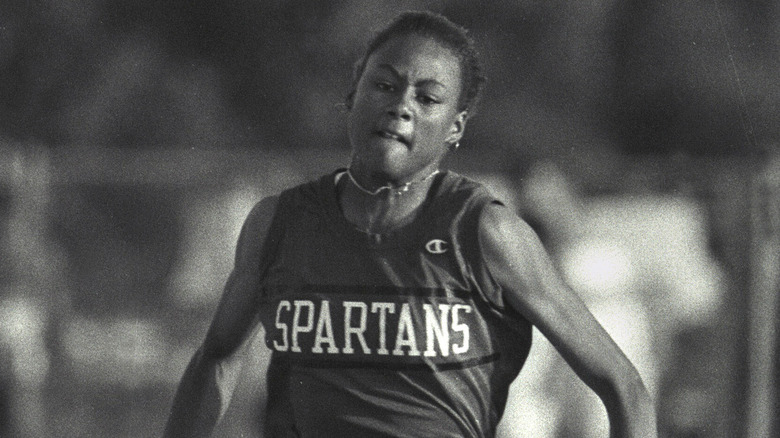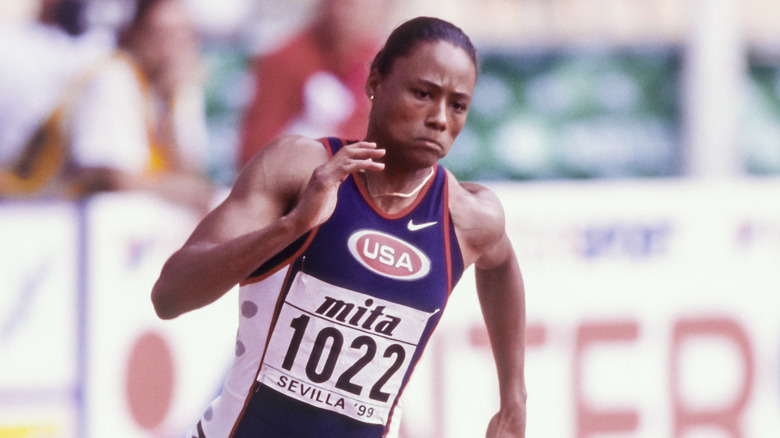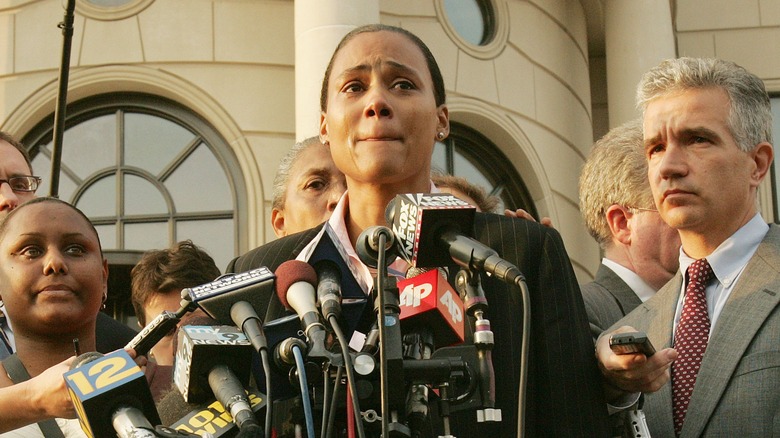All The Details About Marion Jones' Steroid Scandal After The 2000 Olympic Games
In the early 2000s, you could barely turn on ESPN or open an issue of Sports Illustrated without coming across Marion Jones. The track star was a sports world darling — one of the fastest women in the world. She had set a very public goal of winning five gold medals at the 2000 Olympic Games and seemed likely to do it. So when things kicked off in Sydney, all eyes were on her. She didn't quite accomplish her goal — she only secured three golds along with two bronzes — but neither she nor her fans seemed all that devastated by the shortcoming. Sydney, they figured, was just the beginning of a long and successful career.
But then that promising career came to a screeching halt just a few years later when Jones admitted to using steroids. Accusations had plagued her for years, but clean tests and vehement denials of wrongdoing had allowed her to continue competing. Finally, in 2007, with the BALCO scandal at its height and her nearest and dearest squarely in the midst of it, Jones decided it was time to clear up her use of "the clear."
Jones is one of many athletes who have been caught doping, and we have all the details. From her career timeline to her actual role in the BALCO drama to her guilty plea and the public fallout, we're taking a closer look at one of the biggest crimes in sports of the last 20 years.
Marion Jones' early career
Long before steroid allegations and jail sentences, Marion Jones made a name for herself as a multi-sport athlete. According to the Carolina Alumni Review, she was such an accomplished track star and basketball player that she began receiving recruitment letters in her freshman year of high school. Eventually, the California native would settle on UNC Chapel Hill, where she was awarded spots on both teams.
Her early career was marked by major accomplishments and near misses. In 1992, while she was a senior in high school, she was asked to join the Olympic team as an alternate for the 4x100 meter relay, though she turned down the spot to pursue collegiate experience. In 1994, she led the Tar Heels women's basketball team to a National Championship despite having only played the point guard position for a singular season. In 1996, she again had an Olympic team position within her grasp, only to miss out due to a broken foot.
All of this success came as a result of her inherent talent and incredible work ethic, according to UNC coach Sylvia Hatchell. "She was just off the charts as far as her leadership abilities, her work ethic, how coachable she was, how she got along with her teammates," Hatchell told the school-affiliated outlet. "She was without a doubt the best." So when Jones graduated from UNC in 1997 with a degree in communications and an engagement ring from fellow track athlete C.J. Hunter, there was no doubt in people's minds that she'd go far.
2000 Olympic Games
At first, Jones seemed to be living up to those expectations. In 2000, fresh off of several World Championship wins, she was once again offered a spot on the US Olympic Track & Field team. This time, injury-free and without any other demands on her time, she readily accepted.
Jones was slated to compete in five events — the 100m, 200m, 4x100m and 4x400m relays, and the long jump. She was incredibly vocal about her intention to bring home the gold in each, and with her talent and prior successes, no one doubted she could do it. Her earnestness and potential also made her a darling of the games, earning her covers of TIME Magazine and Wheaties boxes before she even competed.
In the end, Jones did wind up winning three golds (in the 100m, 200m, and 4x400m) as well as two bronzes (in the 4x100m and the long jump). But it was the scandal surrounding her husband, C.J. Hunter, that would wind up defining the games for the athlete. Shortly after Jones won her first medal, the International Olympic Committee announced that Hunter had tested positive for banned substances and would be stripped of his credentials (via ESPN). While Jones herself didn't test positive for steroids, Hunter's missteps "dragged Jones's reputation into the mud," as Sports Illustrated put it, because "cynics who follow the Olympics can be quick to attach guilt by association." Ultimately, Jones would never fully escape those suspicions, and they'd follow her through the end of her career.
2004 Olympic Games
Marion Jones continued training and racing in the years after the 2000 Olympic Games. She also divorced Hunter and worked hard to repair her reputation, hoping to distance herself from the steroid use allegations following her for years. And while those whispers never fully went away, her efforts largely worked. She won several medals at the 2001 World Championships, had an undefeated season in the 100m event in 2002, and was named to the 2004 Olympic team.
However, her experience at the Athens games differed from her experience at the Sydney Olympics. For starters, she largely flew under the radar — there were no magazine covers, far less media coverage, and way fewer fans in the stands for her this time around. Additionally, her performances were markedly worse. She only competed in two events, placing fifth in the long jump and dead last in the 4x100m relay.
There was one aspect of the 2004 games, though, that was eerily similar to her 2000 experience — a partner being found guilty of using performance-enhancing drugs and thereby throwing Jones' reputation into question. This time, it was her long-term boyfriend, fellow sprinter Tom Montgomery. He had tested positive for steroids in the lead-up to the Olympics and, like Hunter, had his credentials pulled before the games officially began. Jones, who consistently tested negative, was allowed to compete. Still, given that she and Montogomery shared a trainer, folks were highly suspicious about whether she was truly running unassisted.
The BALCO doping scandal
In the lead-up to the 2004 Olympics, federal agents had begun quietly investigating BALCO (or the Bay-Area Laboratory Co-Operative), suspecting the company of providing steroids to a host of professional athletes (via CNN). An anonymous tipster had informed officials that the company's founder, Victor Conte, had been distributing a new, undetectable substance called "the clear" to athletes in several sports.
Among the big names implicated in the drama were both of Marion Jones' former partners, C.J. Hunter and Tim Montgomery, and her coach, Trevor Graham. All three men were eventually found guilty of participating in the scheme, with Graham faring the worst. Hunter and Montgomery were both convicted of lying to federal prosecutors regarding whether they had ever taken "the clear" and wound up spending several months in jail, paying hefty fines, facing suspensions from the sport, and being stripped of years worth of medals and records. Graham, on the other hand, was convicted of trafficking and administering the substance and spent a considerable amount of time in jail before being banned from participating in track and field in any capacity for life by the U.S. Anti-Doping Agency.
Of course, this mess did nothing positive for Marion Jones' reputation. In fact, the feds began looking into the sprinter in earnest now, convinced there was no way she'd be clean with so many members of her inner circle wrapped up in the scandal. Still, Jones maintained her innocence and continued to test negative for any banned substances.
Marion Jones confesses
Despite previous denials, Marion Jones confessed to using performance-enhancing drugs in 2007. Three long years after an investigation into Jones had opened and nearly a decade since the first steroid accusations had hit the headlines, the track star admitted that she had used "the clear" in the lead-up to the 2000 Olympics.
Her confession came in the form of a letter sent to her closest friends and family. In the note, she wrote that she had been given "the clear" by her coach, Trevor Graham, but maintained that she was not at fault for taking the steroid as she didn't know what the supplement actually was. Shifting the blame to Graham, she told her circle that she was under the impression it was flaxseed oil. In fact, the closest she came to acknowledging her role in the debacle was an admission that "red flags should have been raised when [Graham] told me not to tell anyone."
Days after the letter became public, Jones pled guilty to two felony charges. She admitted to two counts of making false statements to federal agents (one in connection to the steroid use and another in connection to a check fraud case that was vaguely linked to the BALCO scandal). A spokesman for the US Olympic committee told The New York Times that Jones' confession and guilty pleas were "an admission of responsibility from an athlete who owed her sport and the Olympic movement much better than this."
The fallout
Two years after her confession, Marion Jones had her day in court. At her sentencing, she requested a gentle punishment, telling the judge, according to ABC News, "I absolutely realize the gravity of the offenses I've committed. I want to apologize. I plead with you [to not separate] me from my [sons] even for a short while." But the man in question was not moved, replying to the disgraced track star, "Athletes in society have an elevated status. They entertain. They inspire. And perhaps most importantly, [they serve] as role models for children around the world." He then sentenced Jones to six months in prison, two years of supervised release, and 800 community service hours, ensuring that anyone who may have been tempted to follow Jones' cheating example would be properly dissuaded.
Jail time wasn't the only repercussion Jones faced for her wrongdoings, either. The Guardian reported that the Association of Athletic Federations stripped Jones of all race results dating back to September 2000 (which meant that the world records she had set were now null and void), and the International Olympic Committee stripped her of all five of her medals, eventually redistributing them to runners up. Additionally, the USADA imposed a two-year ban that barred the athlete from participating in track and field in any capacity. A representative for that organization told Reuters the decision was intended to be a "valuable reminder that true athletic accomplishment is not obtained through cheating and any medal acquired through doping is only fool's gold."
Getting back on track
Marion Jones was released from jail on September 5, 2008. And while she was eager to move on with her life and leave the entire steroid scandal behind her, the public wasn't quite as happy to let it all go. Her reputation has never fully recovered, as evidenced by the path her life has taken over the last fifteen years.
For starters, in 2007, CBS reported that Jones was broke. Once one of the highest-paid female athletes, the sprinter was reportedly in debt, had her $2.5 million mansion in Chapel Hill, NC foreclosed on, and had to sell two other homes to stay afloat. After her release, her attempt to lock down a steady paycheck wasn't that fruitful, either. She had a brief stint in the WNBA, playing for the Tulsa Shock for two years before she was cut due to her abysmal stats and inability to draw a crowd the way she once had.
These days, local news outlet KXAN Austin reports that Jones runs her own company— a workout program called Camp Gladiator based in Austin, Texas — and spends some of her spare time giving talks to students around the country, advising them to "take a break" when facing burnout or stress rather than making bad decisions with hefty consequences the way she did.
By all accounts, her life in 2023 is a quiet one, which is likely a relief given the drama she was embroiled in during the early 2000s, but it is a far cry from what we all expected from the UNC prodigy.








